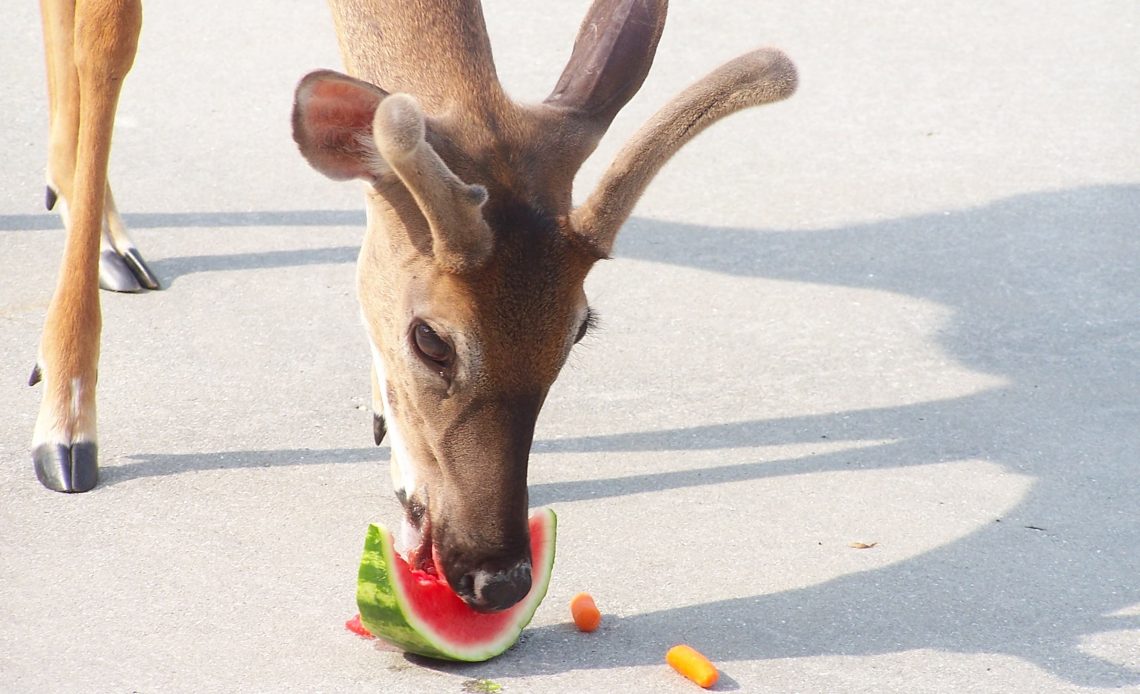

We’re here to help! Wild Yards is a completely free website that is 100% dedicated to helping you create a wildlife-friendly, sustainable yard. Read more
WildYards is reader-supported. When you buy a product through a link on our site, we may earn a comission. Every product is independently selected by our (obsessive) editors and our reviews are unbiased and objective. Read more about our mission or our privacy policy.
Deer are famous for having sweet teeth and are commonly seen eating fresh fruit in the wild. However, it can be quite difficult for those of us who grow our own fruit to know which ones we should protect from local deer. Do deer eat watermelon, for example?
Deer love eating watermelon. It is sweet, refreshing, and full of nutrients and minerals they thrive on. Therefore, watermelon can make a great treat for deer visitors if you are interested in feeding them – however, they can also be difficult to protect.
Do deer eat watermelon plants?
Deer will happily munch into watermelon – the rind and the sweet fruit within – but they won’t tend to eat watermelon plants themselves. Therefore, if you notice your watermelon plants have been harvested of their fruit – and the greenery is left behind – deer have likely eaten the bits they like best.
Deer don’t like slightly prickly, furry, or fuzzy plants. In some cases, watermelon plants can deter deer because they’re not smooth enough for their tastes. Unfortunately, watermelon plants are not considered deer-resistant as their fruits prove to be highly tasty!
How do I feed watermelon to deer?
If you want to attract deer to your garden, you may wish to start by feeding them fruit such as watermelon. However, it’s important to check your local laws – there are some US states where you’re forbidden from feeding deer, whether in your yard or in the wild. This is largely due to population and safety concerns.
However, if you are allowed to feed your local deer and you’d like to give them a treat, feeding watermelon to them is very easy. For example, you could leave chunks of watermelon in an area where deer will be covered and therefore feel safe—in tall grass, near bushes, or at the edge of your yard.
If you purchase a watermelon from a local store, it’s important to prepare it thoroughly before giving it to local animals. You should never be too careless when it comes to chemicals, additives, and pesticides.
Wash the watermelon thoroughly, then cut them up into smaller pieces. Deer love watermelon meat, so ensure that it sticks out easy enough for them to get a good taste. You’ll likely soon have a few visitors coming to take a closer look.
However, in the unlikely case where you might have a watermelon in the winter (most likely store-bought), you should never feed it to deer, as it could cause more harm than good in the colder months. That’s because deer’s wild diets change dramatically towards winter, and you could upset their digestive systems without intending to. It’s best to feed deer on watermelon during spring and summer. The same applies to all fruit you leave out for them – for example, did you know that deer love eating oranges?
Watermelon can be a great natural attractant if you want to avoid deer baiting. But what if you’d rather your local wildlife stay away from your crops?
How do you keep deer away from watermelons?
Now that you know that it is so easy to feed watermelon to deer, you can understand just how difficult it can be to grow them successfully without them getting eaten!
Rest easy – as deer will not often opt to eat young watermelons. Deer prefer melons that are close to harvesting – meaning you likely have a while before they start disappearing. However, for optimum safety over your watermelon, covering and protecting them is essential.
The best way of keeping deer away from watermelon is by keeping your plants in a greenhouse or building fencing around them – a perimeter at least eight inches tall will likely act as a good deterrent. You can set up a second perimeter around the outside to create a thicker boundary if you like.
Since deer are often nocturnal, you can also put infrared lights and noise boxes, to scare them away if they get too close to your fruit.
Do also be careful with the fertilizer you use in your garden. Deer are naturally attracted to fertilizer with nitrogen bases – so always read the bottle or packaging before adding to your soil.
It may also be worth growing deer-friendly plants along the far edge of your yard to act as a sidetrack – meaning your wild visitors will find other tasty distractions elsewhere. This option is viable if you’re already welcoming deer without trying!
Beyond this, harvesting watermelon as soon as it’s ready is essential – and vigilance is key!
